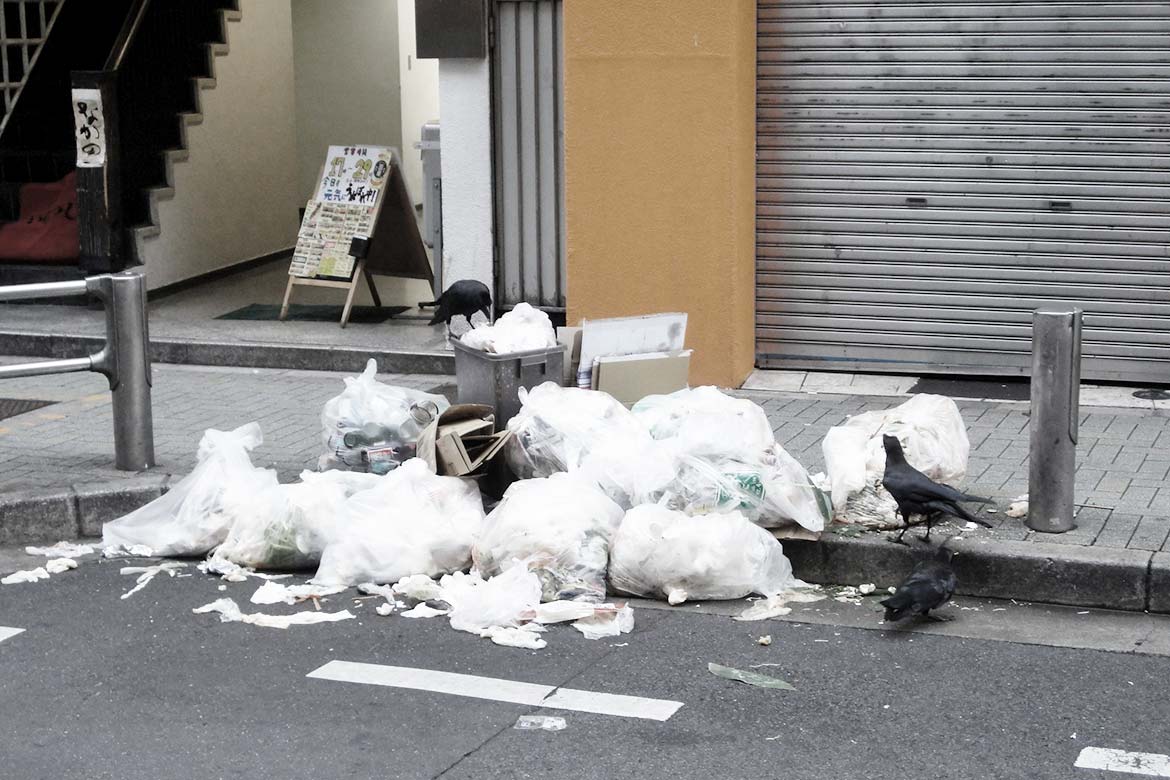Tokyo based group Jidaigumi Basara have gained worldwide recognition online for their stylish and unique eco-samurai performances. But what do they hope to achieve, besides some clever PR?
They cut handsome figures, like ronin from a Kurosawa film. Clad in denim kimono, stoic gazes shielded by the brims of their fedoras, three men prowl the streets searching for their next target. Ahead in the street stands an opponent, waiting silently. They stop suddenly in their tracks and yell out, “Nani yatsu?!” before descending on their enemy. The sound of metal on metal rings out, and in the blink of an eye the battle is over.
This is the work of Jidaigumi Basara, better known as the Gomi-hiroi Samurai (Litter-collecting Samurai). The Tokyo offshoot of Hokkaido-based chanbara (sword fighting) theatrical group Issei Ichidai Jidaigumi, Jidaigumi Basara have gained worldwide recognition online for their stylish and unique eco-samurai performances.
Since being founded in 2016, they have patrolled the streets of Tokyo on the lookout for rogue rubbish discarded by careless passerbys. When they sight a stray pet bottle or fast food wrapper, they brandish their metal tongs like swords and yell their trademark lines, “Nani yatsu?!” (Who did this?!) and “Moral no nai kokoro wo seibai!” (Punish hearts with no morals!), attacking the litter with some impressive moves before tossing it effortlessly in their wicker wastebaskets.
Picking up rubbish isn’t glamorous by any means, so what motivates these heros to wage war on “hearts with no morals”, and yatsu who so carelessly litter? What makes them tick? With their image as eco-conscious pollution-fighting warriors, the answers weren’t quite what I was expecting.
The original group Issei Ichidai Jidaigumi were reportedly inspired by a volunteer they saw cleaning up rubbish in the Hokkaido snows, and decided to incorporate litter collecting into their performances. According to their website, the aim of Jidaigumi Basara performances is to activate local regions by promoting environmental conservation and the formation of morals that better society.
Some kind of disenchantment
I wanted to dive deeper, and asked Issei Ichidai Promote’s Rikiya Takahashi to tell me more about these wandering Gomi-hiroi Samurai. Speaking of morals, was there anything in bushido—the moral code of samurai—that resonates with promoting environmental conservation?
“Our litter-collecting performances have nothing to do with bushido,” he said. “We don’t perform to raise awareness of environmental protection. As a form of entertainment, we hope to make people smile, and believe this will cleanse both their minds and their cities.”
An interesting theory. So what do they hope to achieve through their performances, besides some clever PR? “We hope to create an environment where having morals can be thought of as cool,” Takahashi explained. “We perform only with the hope that people will think the act of picking up trash is cool. At the root of that is a quintessential Japanese stylishness.”
Their moves are inarguably stylish, but is that really enough to get people excited about collecting trash? And does picking up rubbish and cleaning the street really equate to saving the environment, as their coverage in the media would lead one to believe?
A clever marketing angle
Another goal the group claims, as official supporters of the Japanese government’s Re-Style initiative, is educating about the Three R’s. Knowing that recycling in Japan is serious business, we can assume that Jidaigumi Basara members carefully separate and recycle all the items they pick up. But as microplastics pervade our environment and recycling becomes less and less of a viable option, many people believe that we should focus higher up in the three-R hierarchy on ‘reduce’ and ‘reuse’ instead of recycle. So what about their efforts?
“We take the initiative when it comes to eco-friendly activities in daily life, like bringing our own chopsticks and our own bags,” said Takahashi.
He reported that the group also used to wear normal kimono, which would get irreparably damaged by the tongs when performing, and they had to throw many away. “Switching to denim kimonos solved this problem. Using items for longer is one way we strive to reduce waste.”
This waste-reducing concept conveniently fits into one of the group’s planned future endeavours: a line of denim kimono. A clever marketing angle to top off their social media-friendly performance gimmick?
Coolness as a tool
As someone genuinely passionate about protecting the environment, it was disappointing to see how little thought was seemingly put into their decision to incorporate the environment into their samurai spiel. It’s also tempting to think of these entrepreneurial performers as greenwashing buskers who are using the hot topic of environmental awareness as a vehicle to further their own goals.
While this may in part be true, it’s also perhaps not giving credit to their simple yet arguably worthy goal: Creating a world where having morals is cool.
Sure, some environmentally-conscious deeds have gained coolness cred: vegetarianism and veganism can be considered ‘trendy’ these days, as well as the ubiquitous cloth shopping bag and reusable water bottle. Yet it still isn’t really considered ‘cool’ to separate your recycling or yell at smokers who toss their cigarette butts on the ground.
So is it possible to make the humble act of picking up trash be cool? More importantly, can the Jidaigumi Basara performances make people really think about the importance of cleaning up and protecting the environment, instead of just providing social media fodder?
The verdict is still out, but in this age dominated by superficial selfies and Instagram influencers—where looks and likes matter most—perhaps Jidaigumi Basara are not the heroes we need, but the ones we deserve.
Their efforts still feel a little gimmicky and outdated; in 2019 we’ve got bigger fish to fry than simply picking up litter on the streets. Maybe as a follow-up their next act could be “Ban Single-use Plastics Samurai”, “Zero-waste Samurai”, or “Circular-economy Samurai”?
Picture by Dick Thomas Johnson on Flickr by (CC BY 2.0). Thank you <3


